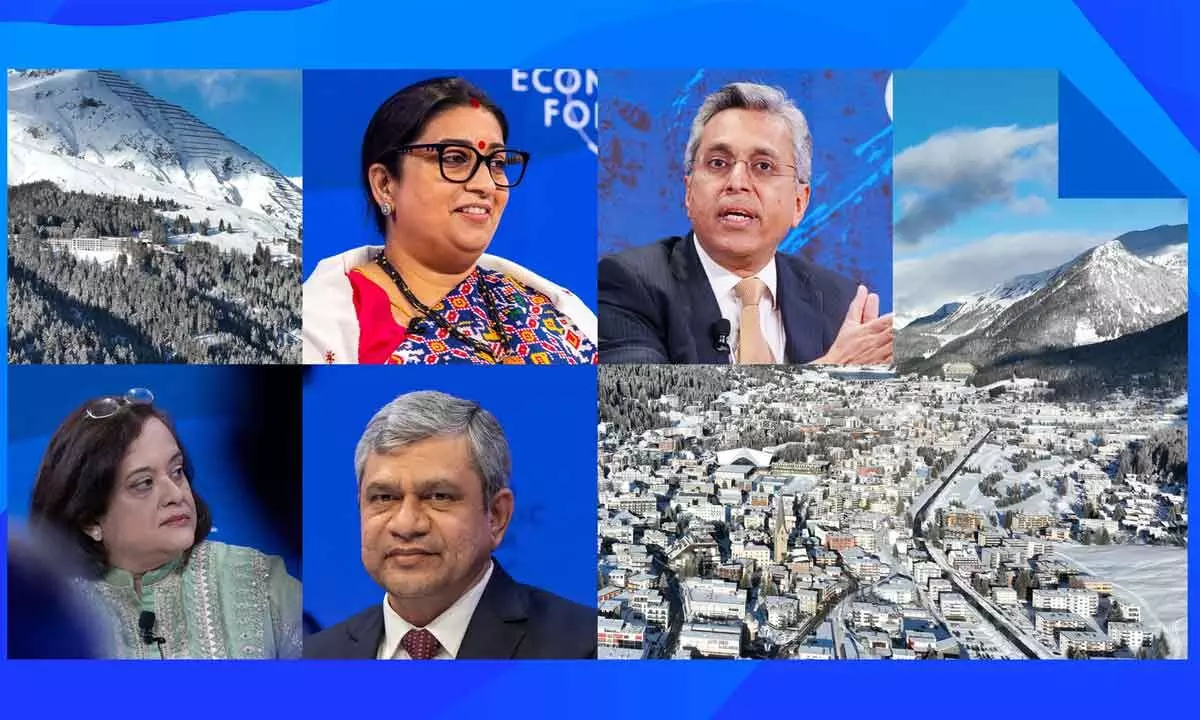Indian delegation shines bright at 54th WEF annual meeting in Davos
Demonstrates India’s resilient economy, investment opportunities across sectors
image for illustrative purpose

The Indian delegation at the 54th World Economic Forum (WEF) annual meeting, during 15-19 January in Davos, Switzerland, made an impactful showcase as India was in the spotlight throughout the event, attracting attention to its strong economy, stable governance and opportunities across several sectors.
The Indian government delegation at WEF was led by Smriti Irani, Minister of Women & Child Development along with Hardeep Singh Puri, Minister of Petroleum & Natural Gas, Housing & Urban Affairs; Ashwini Vaishnaw, Minister of Railways, Communications, Electronics & IT and RK Singh, Secretary, DPIIT, Ministry of Commerce & Industry.
The delegation spoke at various sessions of the World Economic Forum in the presence of other global political and business leaders covering the topics of education, biofuels, gender gaps, renewables, semiconductors, and manufacturing.
India's commanding presence at the annual meeting was marked by four distinct spaces at WEF, each dedicated to highlighting the India opportunity and narrating its growth story to global investors through several lounges. Talking to Bizz Buzz, Tapan Singhel, MD & CEO of Bajaj Allianz General Insurance, who had attended the WEF as part of the CII delegation, said, “We saw a very strong India presence at the summit as five states of the country had shown their presence there.” The issues which were discussed during the summit include AI’s strong presence, sustainability, geo-political issues and how to rebuild trust. People have got lots of hope from India’s growth story cases, he added.
The lounge, India engagement centre, unfolded India's growth narrative, showcasing its digital public infrastructure, vibrant startup ecosystem, and burgeoning energy sector. Fireside chats on globally significant pillars enriched the dialogue.
Experience India centre unveiled the technological leaps powered by new India, commitments to sustainability and inclusivity along with its vibrant culture. India investment centre served as through several lounges. The centre for government-to-business (G2B) and business-to-business (B2B) networking hosted roundtables, sessions, and panels on leading topics. This year a dedicated gender lounge ‘we lead lounge’ focused on women participation in various walks of life, financial inclusion and bridging the digital gender gap. As many as 21 sessions were held over five days at the annual meeting. India showcased its opportunity, opening doors for discussion on manufacturing, technology, gender based impact, sustainability, mobility, startups, healthcare, and AI, among other themes.
Irani held meetings with the leadership of Uber, Mastercard, Unilever, and with the Federal Minister of the European Union, among others. She participated in multiple WEF sessions and panel discussions on themes of public-private agenda for education, protecting democracy in the digital era, and investing in gender parity. The minister graced an event organized by the B20 to launch the B20 global institute. The institute will provide knowledge, research and policy advocacy to global enterprises.
Puri highlighted the immense opportunities in India's hydrocarbons sector in meetings with leaders from corporations such as SOCAR, Shell, Equinor, Honeywell, Occidental, OMV AG, Petronas, Trafigura, BP, Hewlett Packard Enterprise, SAP SE, and Engie. He also highlighted India's commitment to energy transition and sustainable development by providing affordable energy to its citizens.
Vaishnaw participated in a panel discussion with global industry stalwarts to explore how the global economy can leverage investments in infrastructure for business and societal impact. The minister highlighted measures by the government of India to promote infrastructure creation, the reforms implemented, and the role of India's stable economic policies in strengthening its infrastructure. He also held a bilateral engagement with his counterpart from Singapore where AI regulations were discussed.
The minister presented India's semiconductor manufacturing potential to global investors, and spoke about the various cutting-edge technologies being leveraged in manufacturing in India, and the policy interventions being made to further strengthen India's manufacturing sector.
Singh spoke about the transformative potential of Indian entrepreneurship on a global stage. He talked about deep tech and its potential in the Indian context. Singh met leaders from Coca Cola, Mitsubishi, Volvo, and Audi, and discussed their expansion plans in India. He also held meetings with industry leaders from companies such as Nestle, Ericksson, HPE, AB InBev, Nasper-Prosus, and Schnider Electric, among others, discussing their roadmap to increase investment in India. He addressed the WEF session titled - Governors Policy Meeting on Supply Chain and Transport, where he highlighted the impact of PM Gati Shakti program on infrastructure development in India. The secretary also highlighted the ULIP - Unified Logistics Interface Platform.

